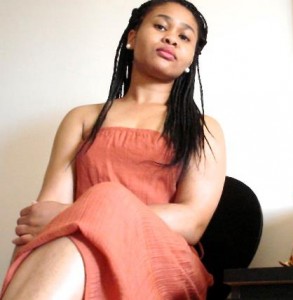
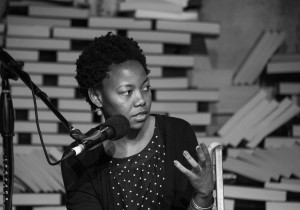
When you encounter a good storyteller you want to find all of his or her work and inhale it. This was the case when I first read Chinelo Okparanta’s story, “Runs Girl”, in Granta’s New Voices. I was struck by how taut and urgent, and how beautiful the writing. Her debut collection eventually came out in May from Granta Books in the UK, and it announced a brave voice that was unafraid to tackle and engage with difficult subjects. Sexuality, domestic violence, elusive love, faith, and religion are some of the themes in a book that gives one the feel of a writer who writes because she must, because she is moved to write, because she has something to say about our world. And yet, charged as her themes are, Okparanta writes with a grace and composure that gives her unsettling stories elegance and a quiet power.
I had to read Okparanta’s stories slowly, because though beautifully written, they are on the heavy side. There is mostly no happiness in these pages, as one of the characters in “Grace” observes, “Happiness is like water. We’re always trying to grab onto it, but it’s always slipping between our fingers.” The ten stories tread mostly on domestic territory where nothing is still, nobody is at ease, and joy is fleeting. It’s mostly the women who are living these tumultuous lives, whether they are under pressure from failing to conceive, for having dark skin when the standard of beauty is light skin, from abusive husbands who make their marriage a conflict zone, from trying to make ends meet when simply existing is difficult enough, from the struggle to find love and intimate connection. These may seem familiar issues, because we’ve lived them, seen them lived around us, but Okparanta’s unflinching eye for detail surrounding the complexities of life allows her to deliver startling and unsettling narratives; in “Story, Story!” for example, a desperate woman befriends and poisons pregnant women so that she may steal their unborn babies.
Okparanta immigrated with her family from Nigeria when she was ten and writes from both countries with an ease that shows that she is comfortable both in her Nigerian and American homelands. The result is a book that is not necessarily Nigerian or American, a book that does not seek to choose sides, a book that does not seek to privilege one nation or culture over the other. In fact, in the end, it is a book not about countries or cultures. It is simply a book about humanity—about people and their stories, in whatever settings the people happen to find themselves.
I corresponded briefly with Okparanta over the course of a few days. As a fellow debut writer, I was interested to know not only about her journey as a writer, but also about the details surrounding her stories:
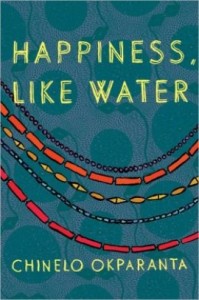 Your stories are physically set between the US and Nigeria. I’m curious to know if these different landscapes have any bearing at all on the way you write? Do you approach writing about one country differently from the other?
Your stories are physically set between the US and Nigeria. I’m curious to know if these different landscapes have any bearing at all on the way you write? Do you approach writing about one country differently from the other?
For me, the setting—the geographical location, the landscapes—is a thing that is borne out of the story itself. I’ve never approached a story by thinking of the story’s location as anything separate from the story itself. The location is simply a condition inherent in the nature of the story.
One of the refreshing ways in which Nigeria comes alive to me is through food: goat meat in pepper soup and utazi leaves, plantain, garri and soup, jollof rice and beans and yams, etc. As a food-lover it’s hard not to notice. What’s your relationship to Nigerian cuisine? Do you cook?
I love Nigerian cuisine. I love food in general, but I think Nigerian cuisine must be some of the tastiest foods out there. There are no words to describe the scrumptiousness of well-seasoned egusi soup eaten with a side of freshly made pounded yam. Also, I’m addicted to plantains, and I eat lots of rice and stew.
I do cook, but unfortunately, I no longer make any of the complicated dishes—so no soups really, because you’ll need special ingredients for those, and these ingredients are hard to come by in places like Iowa and rural New York where I’ve been living for the past few years. Also, making the soups is very time-consuming, and when you’ve got teaching and grading and reading and writing, and other things to do, sometimes food is the compromise you make.
Your love for Nigerian cuisine certainly shows, and you write food in a way that can only come from one who cooks. But let’s move from food for the body to food for the soul, so to speak. Faith and religion is a common thread in your stories, with Christianity dominating both the Nigerian and American spaces. But I’m curious about the traditional religion, perhaps most evoked in the stories “Wahala” and “Story, Story!” What draws your characters to this specific religion?
A 2012 WIN-Gallup poll placed Nigeria as the second most religious country in the world. In addition to Christianity, there is a strong Muslim presence in the country. One could say that there is also a strong presence of spiritualism of the traditional sort: dibias and witch doctors and traditional healers. My stories are realistic stories. They paint a realistic image of Nigeria. It makes sense that the dibias and witch doctors and traditional healers would make an appearance at one point or another.
After a couple of failed attempts at a US visa, the protagonist in “America” finally gets one, but you complicate the story with the folktale that forces her to consider the meaning of her impending departure: “But what happens when all the hens are gone, when they have either run away or have been destroyed?” What is your feeling about the movement of people away from their homelands? Are there things we should consider like our character?
I don’t believe that the decision to leave one’s native country is ever an easy one. Even in circumstances of war—refugees, that is—I imagine that there is a burden of departure that stems from a love for or loyalty to homeland. As far as things to consider, that is a personal call. People often speak of the ‘brain-drain” phenomenon, and I can certainly see how that might be one of the unfortunate side effects of educated citizens deciding not to return to the home country, effectively investing their talents, their intellectual faculties, etc. in a different nation altogether.
In the stories set in America, some of your characters stand out for doing things the way they would in Nigeria — from rinsing greens in “Designs”, to the mother pounding yam in “Grace”, to the traditional dress that some of your characters wear. These are of course ways in which immigrants hold onto the old country, and we understand it as part of keeping a connection to the homeland. Do you have any tendencies of your own that tie you to your motherland?
I still eat traditional Nigerian foods—soaked garri, moin moin, etc. I speak Igbo—and English with a strong Nigerian accent—within my immediate family. For some years after we came to the US, my mother continued to pound yam with a mortar and pestle.
“When I think of Massachusetts, I think of cockroaches and mice, inflated and brown, brazen and indiscreet, not like the ones in Port Harcourt,” the narrator of “Tumors and Butterflies” observes. Where does such a startling detail come from? (As in, are you trying to tell us something?)
I’m not trying to say anything extraordinary. The detail comes from an observation I made of the mice and cockroaches in Nigeria versus those in the US. It’s not any sort of scientific study on my part, just one momentary observation that somehow made it into the story. It’s 2013 now. The observation was made in something like 2005. Who knows, perhaps the mice and cockroaches in each place are now behaving differently.
Well, I confess I chuckled when I read the line because as a kid I didn’t associate America with cockroaches or dirt etc., mostly because of the fancy images I saw in the media. And then I encountered my first cockroaches in Texas, and those things looked like they lifted weights, coats shiny and all; I’ve never seen healthier cockroaches in my life. In a strange way, it pleased me that this place, too, has cockroaches. Anyway, I’ll leave it there for now, but I’m curious about your relationship to writing at this point in your career. What is the most exciting part of it? And the least exciting?
These days, I spend quite a bit of time responding to interview questions. I’ve also been writing some personal essays, which is not something I thought I’d be doing at this point in my career. I enjoy writing fiction much more, so essay writing has felt a little like a chore.
I think I know what you mean – there are indeed other things to juggle besides the one thing you are dying to write. Well, apologies for this one extra chore, especially because you are supposed to be working on a novel. Is there anything you want to tell us about the novel?
It’s a real pleasure to be interviewed by you, so no worries about this one extra chore. As for the novel, the story is out, but I am currently working on re-structuring it, as I’ve gotten feedback that seems to hint that the structure could stand to be a bit more complex. I think my editors have a point. The feedback sounds about right.
Well, I can’t wait to drink it. This is a topic you are probably tired of at this point, but still, congratulations at being most recently shortlisted for Africa’s leading short story prize, the Caine Prize for African Writing. What did that mean to you?
Yes, it’s a topic that has been coming up a lot lately. Many thanks for your congratulations. It was wonderful to have my work recognized by the Caine Prize. It was my first experience in a literary prize situation, and it was definitely a learning experience. I am grateful to all the wonderful readers who came out both privately and publicly to express their support for my writing. People say that they never forget an insult. For me, it’s the encouragement and the kind words that I never forget. Kindness is so rare these days that it startles. As for the Prize itself, all prizes are political and, like anything else in this world, they are flawed. But prizes are also essential in promoting readership; and as writers often write about important sociopolitical topics, literature—and the prizes that support it—can be seen as gateways to change.
Which is all to say that I was pleased by the nomination.
What would have meant more to you— to be shortlisted for any writing prize or to be shortlisted for an African writing prize? Basically, what is your opinion on the “African” writer debate?
Understandably, many writers want their stories to reach as wide an audience as possible, and it is true that rigid categorizations can sometimes lead to the exact opposite effect. Furthermore, pigeon-holing a person into just one category (“African” in this case) sometimes has a way of doing disservice to—in effect, dismissing or at least devaluing—all other aspects of the person’s identity, or of the person’s writing. I myself tend to find categorizations limiting and even othering. But that being said, I acknowledge that categories can also be affirming. In recent history, they have even been necessary, in civil rights movements, for instance. And, as my stories are African-themed; and as I myself am deeply African, I can say that there are certainly worse things than being categorized as such.
I must say as your reader I’m not worried about your categorization. Your stories make it understood that they are written by someone who has an African connection, but they really are just stories about humanity, and I think that is the only category that matters in the end. In any case, I’m always curious about where writers come from in terms of inspiration. What can you tell us about the stories in Happiness, Like Water?
The stories all have different origins. “Shelter” and “Tumors and Butterflies”, for instance, are the most autobiographical of the stories. I drew from my own personal life experiences for those two. Other stories, such as “Runs Girl” and “America”, were inspired by events back home in Nigeria, but they are not autobiographical, not in the way “Shelter” and “Tumors” are. And then of course there are other stories which score even higher on the fictional scale.
Did writing about your lived experience do anything to/for you? Do you think writing can be transformative for the writer?
Writing the autobiographical stories “Shelter” and “Tumors” served as a sort of purging for some personal crises in my life, a sort of “letting go.” I think, as a writer, I needed first to explore myself and my past from a fictional standpoint in order to be able to delve more fully into fiction. Now, having written about those personal topics, I feel a sort of liberation. I’ve noticed that my stories these days are far more fictional than ever before. So, yes, I think writing can indeed be transformative for the writer.
What non-writerly things do you do when you’re working? What carried you through writing Happiness?
I was living in Iowa City when I wrote the stories in Happiness. Iowa City is very beautiful and serene. A river runs through the University campus. I went on lots of walks along the river while I wrote–mindless walks, just for the purpose of visiting the river. In the winters you can sometimes hear the cracking of the ice beds. The sound is a little like a groan. There’s something haunting about the way the entire river freezes and then just as soon as you’re getting used to it in that state, it begins again to melt.
And in the end the river eventually becomes part of the work; you write it so vividly in “Grace” that I can see and hear it. But “Grace” aside, many of your stories focus on women under all sorts of pressure, from difficult relationships to image issues, to various types of anxieties to overwhelming societal expectations. What draws you to this specific territory?
I am a woman. I’m from a large family of primarily women, especially on my mother’s side where there are eight sisters (The only boy died at the age of ten). My mother’s mother was herself from a family of all girls—six in total. My own siblings are made up of three girls and only one boy. My cousins are primarily women—one family is made up entirely of six sisters and their mother. So, basically, the struggles of women have been very evident to me throughout my life. And, I’ve always felt an obligation to address them via my writing. I’d feel as if I were doing disservice to myself, and to the many women in my life—perhaps to womanity as a whole—if I didn’t address some of these issues at some point in my writing career.
You’ve been teaching creative writing for a while now; at Iowa, Colgate, and soon, Purdue – how does teaching affect your creative energy?
I enjoy teaching very much. It’s a privilege to be given the opportunity to converse with people who share an interest in creative writing. My students are generally very engaged, and my conversations with them often lead me to new insights on the works of fiction being discussed. That being said, teaching is time-consuming, and mental energy is exhaustible. When I teach, I find that I invest my mental energy in analyzing and understanding and improving student work, and as such, there’s less mental energy left for my own writing.
I’ve recently had the pleasure of reading “Benji,” your New Yorker story, and I’m fascinated by the conversation the piece is having with “Corrie” by Alice Munro, while of course still being its own solid story. Can you say more about that relationship?
I was introduced to Alice Munro while at Iowa and immediately became a big fan because so many of her stories felt so “Nigerian.” Reading her stories was the first and only time (so far) I was reading stories that, though written by a Western writer, and grounded in a Western setting, felt as if they could have occurred in Nigeria. My idea for “Benji” was to write a story about a poor couple in Nigeria who create an illness plot in order to scam a rich short, pale-skinned dwarf of a guy. While working on it, I realized that I wanted “Benji” to work as a sort of homage to Munro’s “Corrie” while also grounding itself in Nigeria. There’s all this talk about African poverty porn, and African writers sometimes get heat for showing poor, unattractive sides of Africa. I wanted to show the lifestyle of the Nigerian elites in this story, while still including some of the not-so-flattering aspects of the culture (i.e. the negative aspects of religion or the money swindling aspect of Nigeria, or the way the elites have to travel to foreign countries for medical care because our system of health care is not quite where it should be), because all of these together form our Nigerian reality. Beyond that, I wanted this story to parallel closely Munro’s story in order to see how the sociocultural discourse would change when written by an African and set in Africa versus a very similar story written by a Canadian/a Westerner and set in the West. That is, my hope was to help set up a discourse about how space and culture can influence a story and how it is read.
I think it’s a fine experiment, and I like that the parallels actually open up to elements that are strictly unique to “Benji” and give it its own texture and “storiness.” And lastly, going back to Happiness, I’m curious to know, what is your favorite story?
“Runs Girl” is a nice story, I think. Heartfelt. But so is “Story, Story!”, in a haunting sort of way. I like the rest too, for different reasons. I can’t say that I have a favorite. I’m more interested in knowing the favorites of my readers. Do you have a favorite?
My favorite things change based on my space and mood. There was a time I loved “Grace” for its lyrical prose, the delicate balance of the sweetness of desire and unspoken love, and the bitterness of the characters’ realities, the decisions we make and don’t make and what they mean to our happiness. I read that story with a lump in my throat, because compassion and honesty are there on the page, guiding the narrative. For now though, my favorite is “Story, Story!” simply for making me sympathize with a character I despise, for reminding me how complex life is, though this is something you do in your other stories as well. The decision to frame the story so that we process it as a told story is a smart choice and allows Nneoma a distance and space that makes for interesting revelations and surprises – I like the feeling of reading the thing not quite knowing what else will be revealed and when, reading like I’m peeling something. Thank you for writing.
My pleasure. And, my thanks to you for such thoughtful reading.
NoViolet Bulawayo is the winner of the 2011 Caine Prize for African Writing and a recipient of the 5 under 35 Award from the National Book Foundation. Her first novel, We Need New Names, was short-listed for the 2013 Man Booker Prize. She is currently a Wallace Stegner Fellow at Stanford University.


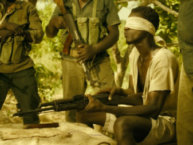
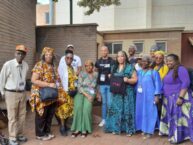

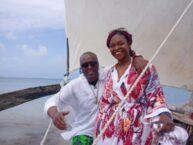
3 comments for “NoViolet Bulawayo Interviews Chinelo Okparanta”